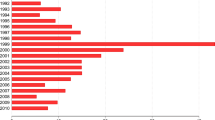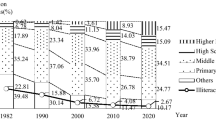Conclusion
The 1947 education reform and mass education after the period of high economic growth have greatly influenced women's higher education attainments. These changes are beginning to transform women's views towards education and more women with higher education attainment are entering the labour marker.
However, as previously indicated, many obstacles to equal opportunity and results in the labour market still remain for women. Higher education for women has never had the same social impact as that for men. So far as the academic career of women is regarded as having ‘symbolic value’—it has a close relationship to marriage in Japanese society. Women's higher education is a social way of maintaining a sub-culture and traditional gender norms.
Similar content being viewed by others
References and bibliography
Akamatsu, R.; Hayami, T. 1986.Danjo Koyo Kikai Kintoho [Equal employment opportunity act]. Tokyo, Yuuhikaku Ribure.
Amano, M., ed. 1986.Joshi Koto Kyoiku no Zahyo [Goal of women's education]. Tokyo, Kakiuchi Shuppan.
Arai, K. 1990. Daigaku Shingakuritu no Kettei Yoin [Determinant factor for promotion rate to university].Economic study, vol. 41, no. 3.
Bowmen, M. J.; Osawa, M. 1986.Developmental perspectives on the education and economic activities of Japanese women. Washington, DC, Office of Educational Research and Improvement.
Clark, B.R. 1981.The higher education system: academic organization in cross-national system. Berkeley, CA, University of California Press.
Cummings, W.K. 1980.Education and equality in Japan. Princeton, NJ, Princeton University Press.
Engel, J.W. 1986.A comparison of Japanese and American housewives' attitudes toward employment of women. (Paper presented at the annual conference of the National Council on Family Relations.)
Engel, J.W. 1987.Generational differences in Japanese attitudes toward women's employment. (Paper presented at the annual conference of the National Council on Family Relations.)
Fujimura, K.F. 1985. Women's participation in higher education in Japan.Comparative education review (Chicago, IL), vol. 29, no. 4, p. 471–487.
Fujin Kyoiku Kenkyukai, eds. 1991.The present status of women in statistics. Tokyo, Kakiuchi Shuppan.
Giele, J.Z.; Smock, A.C., eds. 1977.Women, roles and status in eight countries. New York, Wiley.
Institute for Democratic Education. 1992. Josei to Koto Kyoiku [Women and higher education].Gendai no Koto Kyoiku. Tokyo, IDE.
Inoue, T. 1985. Sengo Joseishi Ryakunenpyo [The post-war history of Japanese women],Julist (Tokyo), no. 39, p. 284–303.
Iwai, H. 1990. Joseino Lifecourse to Gakureki [Women's lifecourse and educational background].In: Kikuchi, S., ed.Gendai Nihon no Kaiso Kozo Series 3: Kyoiku to Shakaiido. Tokyo, Tokyo Daigaku Shuppankai.
Japan. Ministry of Education, Science and Culture. 1991.Wagakuni no Bunkyo Sesaku [Educational policies in Japan]. Tokyo, Ministry of Finance Press.
—. 1994.Wagakuni no Bunkyo Sesaku [Educational policies in Japan]. Tokyo, Ministry of Finance Press.
Japan. Ministry of Labour. Agency for Women. 1994.Hataraku Josei no Jitsujo [The present status of working women]. Tokyo, Ministry of Finance Press.
Japan. The Prime Minister's Office, eds. 1994.Joseino Genjyo to Sesaku [The present status of women and policy]. Tokyo, Ministry of Finance Press.
Japan. The Prime Minister's Office. Public Relations, eds. 1990.The monthly journal of national survey. April.
Japan. The Prime Minister's Office. Public Relations, eds. 1992.The monthly journal of national survey. July.
Japan Economic Newspaper. 1990. A survey for working women.The Nikkei weekly (Tokyo, Nikkei Research).
Japan Institute of Labour. 1992.The report for career consciousness of female workers and support system. Tokyo, Japan Institute of Labour.
Japan Women's Group Federation, eds. 1990.Women white paper. Tokyo, Horupu Shuppan.
Joseigaku Kenkyukai, eds. 1990.Gender and sex discrimination. Tokyo, Keiso Shobo.
Joseishi Sogo Kenkyukai. 1990.Nihon Josei Seikatsushi: No. 5. Gendai [The history of Japanese women's life]. Tokyo, Tokyo Daigaku Shuppankai.
Kawahigashi, H. 1983 Nihon Shihonsyugi to Joshi Rodo [Japanese capitalism and women's labour].In: Takenaka, E., ed.Joshiroudouron: Kikaino Byodo kara Kekka no Byodo he [Equality between men and women]. Tokyo, Yuuhikaku Sensho.
Kawashima, H.Y. 1985.Joshirodo to Rodoshijyo Kozo no Bunseki [Analysis of women's labour and labour marker structure]. Tokyo, Nihon Keizai Hyoronsha.
Kondo, H.; Watanabe, H. 1990. Kekkon to Kaisoketugo [Marriage and stratification].In: Okamoto, H.; Naoi, M., eds.Gendai Nihon no Kaiso Kozo Series 4: Josei to Shakaikaiso. Tokyo, Tokyo Daigaku Shuppankai.
Levin, H.M. 1976.Equal educational opportunity in Western Europe: a contradictory relation. (Presented at the annual meeting of the American Political Science Association.)
McNeil, J.D. 1990.Curriculum: comprehensive introduction. Boston, MA, Little, Brown & Co.
Mitsui, T., ed. 1977.Nihon Fujin Mondai Shiryo Sakusei: Kyoiku [Japanese women's problems: education]. Tokyo, Domes Shuppan.
Murata, S. 1990.Kyoiku Joseigaku Nyumon [The guide for women's educational studies]. Tokyo, Shinzansha.
Narumiya, C. 1986. Opportunities for girls and women in Japanese education.Comparative education (Abingdon, UK), vol. 22, p. 47–52.
Okamoto, H. 1990. Josei to Shakaikaiso Kenkyu no Tenkai [Study for women and social stratification].In: Okamoto, H.; Naoi, M., eds., op. cit..
Parsons, T.; Platt, G.M. 1973.The American university. Cambridge, MA, Harvard University Press.
Shiina, A. 1990. Joseini okeru Gakko Riyoso no Bunseki [Analysis of women's group who enter higher education].In: Kikuchi, S., ed., op. cit..
Shimizu, H. 1990. Gakuraki, Kekkon, Kaiso Saiseisan [Educational background, marriage, social stratification reproduction]In: Kikuchi, S., ed., op. cit..
Sodei, t.; Yano, M., eds. 1987.Gendai Josei no Chii [The position of modern Japanese women]. Tokyo, Keiso Shobo.
Takahashi, H. 1990.Shinjidaino Joshi Rodo: Danjo Koyo Kikai Kintoho no Kiseki [Women's labour in new age: after equal employment opportunity act]. Tokyo, Gakuyoshobo.
Yamada, R. 1993.The gender roles of Japanese women: an assessment of gender roles of Japanese housewives living in the United States. (Ph.D. dissertation at the University of California.)
Author information
Authors and Affiliations
Additional information
Ph.D. in education (dissertation: ‘The gender roles of Japanese women’) from the University of California in 1993. At present affiliated to the PHP Research Institute (Japan) as a senior research associate. Areas of interest include comparative higher education, educational policy, and gender and education. Her most recently published works in English are ‘Higher education in partnership with industry: the necessity to employ off-the-job-training system’ in theInternational journal of lifelong education (vol. 12, no. 2, 1994) and ‘The gender roles of Japanese women: an assessment of gender roles of Japanese housewives in the United States’ inPHP research report (vol. 9, 1995).
About this article
Cite this article
Yamada, R. Higher education and gender roles in Japanese society: An assessment of disparity. Prospects 25, 791–802 (1995). https://doi.org/10.1007/BF02334153
Issue Date:
DOI: https://doi.org/10.1007/BF02334153




